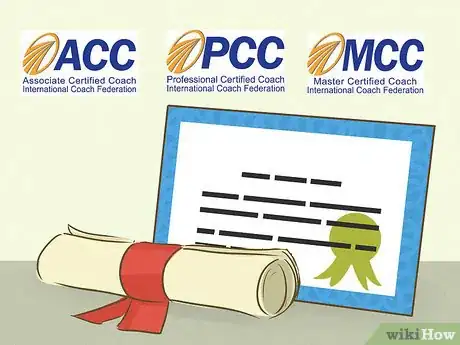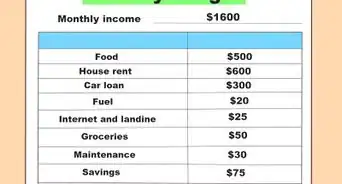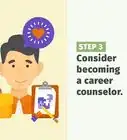This article was co-authored by Kamila Tan. Kamila Tan is a Recovery Coach, former Division I Collegiate Athlete, Inspirational Speaker, and Mental Health Advocate. She is the Founder of Embracing Strength LLC, a coaching business with the mission to provide support for athletes recovering from disordered eating and body image issues and provide support for their families. Kamila informs her work helping athletes pursue recovery with her experience playing beach volleyball as a Division I NCAA collegiate athlete. Kamila holds a Bachelor’s Degree in Psychology and a Master of Public Health from the University of California at Los Angeles, and is currently pursuing her Master of Social Work from the University of Southern California.
There are 7 references cited in this article, which can be found at the bottom of the page.
wikiHow marks an article as reader-approved once it receives enough positive feedback. In this case, 100% of readers who voted found the article helpful, earning it our reader-approved status.
This article has been viewed 79,964 times.
Certified life coaches are people who are trained in helping others reach their potential in their professional and personal lives. While there are no regulations regarding becoming a life coach, those who chose to be certified by a respected coaching body must complete training requirements, log hours of coaching, and complete a competency exam. This rigorous process assures clients that they have achieved the standards set forth by the International Coach Federation (ICF), the body that oversees life coaching certification.
Steps
Training to be a Life Coach
-
1Use online training modules. Participating in live online training sessions allows you to take the training modules in the convenience of your own home if there is not a training center location close to you. You will participate through web conferencing technology with life coach teachers and other students.
- Online courses may be available through specific coaching organizations, such as the International Coach Federation[1] , or through current programs offered by practicing life coaches.
- To get recommendations on the right training modules for you, find a current life coach that you respect and ask them, “What resources did you use to get your start with this career?”
- Training modules provided or accredited by the ICF are generally coupled with a small number of mentorship hours for new life coaches to receive their credentials. There are many training modules available outside of the ICF, but these may require more mentorship hours to complete your certification.
-
2Find distance learning courses. Similar to online training courses, you can often find distance learning training courses that allow you to work through self-study guides in addition to virtual classrooms. This method also allows you to work at your own pace, and may offer more comprehensive education than individual modules.
- Many distance learning courses are offered as degree or certificate programs through community colleges and universities. Such courses may allow you to learn online, or attend on campus if there is a program near you.
- Distance learning courses often offer certificates in life coaching or degrees in a related field, such as psychology, with a concentration in life coaching. Getting a degree does not necessarily mean you have your credentials, though, nor are such degrees required for getting your credentials.[2]
- Some distance learning courses may also help you reach a certain number of client contact hours, which will be required to receive your coaching credentials.
Advertisement -
3Participate in local workshops. Some training organizations offer training to become a life coach through workshops of varying duration. Check with local life coaches to see if they are doing any workshops for aspiring coaches, or look on the ICF website.
- Workshops offer some unique opportunities to learn about specific specializations while in training. For example, coaches specialized in faith-based coaching, coaching for different age groups, or transformation-based coaching may offer workshops on how to break into that particular niche.[3]
-
4Meet one-on-one with a mentor. Another way to get life coach training is through one-on-one mentoring with a qualified professional. You can meet with a life coach in person, over the phone, or through online meetings to get training tailored to your needs.
- Reach out to local life coaches via email or over the phone and say, “I am looking to get my credentials as a life coach. Are you taking on any mentees at this time?”
- Independent organizations such as the ICF or the Coach Training Alliance[4] may also be able to place you in contact with mentors suited to your specific needs.
- A mentor may also be able to help you work toward the client contact hours needed for your credentials by allowing you to work with them in parts of their practice.
Applying for Your Credentials
-
1Look at different credential levels. Life coach certification is administered through the International Coach Federation. According to the ICF, there are 3 levels of certification to be a life coach:
- Associate Certified Coach (ACC). This credential requires 60 hours of coach training, and 100 hours of client contact.
- Professional Certified Coach (PCC). This credential requires 130 hours of coach training, and 750 hours of client contact hours.
- Master Certified Coach (MCC). This credential requires 200 hours of coach training, 2,500 hours of client contact hours, and 10 hours of work with a qualified mentor.
-
2Start client contact hours. In order to get your credentials, you will need to start working with your own coaching clients and recording your progress as a coach. Contact the ICF or work with your training program to get started with new clients.
- Work with your mentor to get recommendations for potential clients. Ask them, "If you meet with a new client but cannot take them on, would you provide them with my information?"
- Many training programs will provide you with information on how to begin the client contact process.
-
3Log your client contact hours. Credentials are the hallmark of a qualified life coach, but they are not necessary to get started coaching. In fact, to get your credentials you need to log a certain number of hours as a coach with your own clients first. Begin coaching clients using what you learned in training.
- A coaching log will be necessary to get your credentials. Keep a thorough log of your coaching activities in order to apply for your credentials.
- Samples of coaching logs may be found online from resources posted through other life coaches, or you may opt to use an app or software such as Life Coach Office[5] to keep a comprehensive digital log.
- All client contact hours must have occurred less than 18 months prior to the day you apply for your credentials. If you are interested in furthering your credentials in the near future, keep recording these contact hours even after you receive your first set of credentials.
-
4Submit your application. Compile proof of your training hours, such as transcripts or certificates of completion, as well as your coaching log. Submit these along with the credentials survey and other application material to the ICF.
- If you have any questions about the materials required for your credentials, or if you are not sure if your training program meets the ICF requirements, contact their offices directly to ask for assistance.
-
5Take your Coach Knowledge Assessment. After your application for credentials is reviewed, you will be prompted to take a Coach Knowledge Assessment test. This exam is required by the ICF, and focuses on creating open channels of communication with clients, fostering results through active coaching, and adhering to the ICF's code of ethics.
- Depending upon your coaching credentials path, you may take the exam at a different point during your application review.
- The exam is offered in a number of languages including English, Spanish, French, Chinese, and others. Check to see if the exam is available in your native language.
Specializing Your Practice
-
1Choose your niche. Once you have been certified as a life coach, you can work in many different areas and in different capacities. Many life coaches will likely start their own practice, working with clients directly on specific areas of knowledge.
- Areas of specialization can include business coaching, career coaching, time management, health and wellness coaching or academic coaching.
- No additional training is required to specialize. Instead,develop your business by offering your skills to a niche group that is looking for coaching, such as businesses or those in relationships.[6]
-
2Find continuing education. No further training is required to specialize your practice, but continuing coaching education may help you find a specialty for your practice. Look at working with a mentor, or find a training program that will help you specialize.[7]
- Specialization courses are often from for-profit programs and are generally not affiliated with the ICF.
-
3Start your practice. Once you have your training, credentials, and specialization, you are ready to start working as a certified life coach. Start recruiting clients into your practice that want coaching relating to your specialization.
- Try to continue working with clients from when you were accruing your client contact hours, as well.
- Keep attending workshops and continuing education courses during your coaching career to learn about new practices and keep your coaching skills sharp.
Community Q&A
-
QuestionHow much do coaches get paid per hour?
 Tom De BackerTop AnswererContact the ICF to get statistics. Also, look at it from a different perspective: how much do you want to earn in a month? Divide that by the amount of hours you have available - that's your hourly rate. Of course, if it's wildly above or below average, that will affect your client base. But if everybody else is charging $50/hour, and you need $100 to get by, that's a good indicator your calculations/expectations are wrong.
Tom De BackerTop AnswererContact the ICF to get statistics. Also, look at it from a different perspective: how much do you want to earn in a month? Divide that by the amount of hours you have available - that's your hourly rate. Of course, if it's wildly above or below average, that will affect your client base. But if everybody else is charging $50/hour, and you need $100 to get by, that's a good indicator your calculations/expectations are wrong. -
QuestionWhat must I do in order to start the course to become a certified life coach?
 Susan ButlerCommunity AnswerWhat you need to do will depend on what country you live in. You may have to attend a short course, or perhaps a workshop, or even complete a certificate within a schooling environment.
Susan ButlerCommunity AnswerWhat you need to do will depend on what country you live in. You may have to attend a short course, or perhaps a workshop, or even complete a certificate within a schooling environment. -
QuestionI'd like to become a certified life coach. I have worked with women, as well as middle school and high school girls and been successful. How can I become a life coach?
 Community AnswerRead and follow the steps in the article.
Community AnswerRead and follow the steps in the article.
Warnings
- There are many qualifications one can accrue to become a life coach, and there isn’t a one-size-fits-all-path to becoming a life coach.⧼thumbs_response⧽
References
- ↑ https://www.coachfederation.org/
- ↑ http://www.cbsnews.com/news/top-10-professional-life-coaching-myths/
- ↑ http://www.lifecoachfaq.com/coaching-niches/
- ↑ http://www.coachtrainingalliance.com/
- ↑ http://www.universalcoachingsystems.com/life-coach-office/
- ↑ http://www.socialworktoday.com/archive/052010p22.shtml
- ↑ http://www.lifecoachtraining.com/programs/specialties_path/
About This Article
To become a certified life coach, start by finding local workshops to learn the fundamentals of life coaching. If you can’t find any in your area, you can also do an online training course, which offers live sessions, since you’ll need a minimum of 60 hours of coach training. You can also search for a mentor, either online or in your area, who can offer tailored one-on-one support. To get certified, you’ll also need at least 100 hours of client contact, which you can do through your training program or by contacting the International Coach Federation. Once you’ve hit the minimum hours of training and client contact, collect proof of your training hours and coaching logs and submit your application to the ICF for certification. For more tips from our Life Coach co-author, including how to start your practice as a life coach after you’ve been certified, read on!


















-Step-9.webp)























































